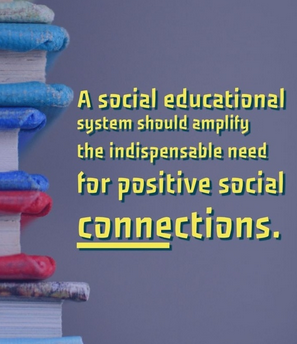Can Our Nation Be Saved? Part 4

Remember those childhood days of the dreaded report card by which your intelligence, your comportment, your reading or math groups, almost your very worth were determined by the letters entered on that report? I can remember a feeling akin to terror at report card time.
The researcher Alfie Kohn cites his research results indicating the negative impact of grading systems on students.
- 1. Grades tend to reduce students’ interest in the learning itself.
- 2. Grades tend to reduce students’ preference for challenging tasks.
- Grades tend to reduce the quality of students’ thinking.
- 4. Grades aren’t valid, reliable, or objective.
- 5. Grades distort the curriculum.
- 6. Grades waste a lot of time that could be spent on learning.
- 7. Grades encourage cheating.
- Grades spoil teachers’ relationships with students. Grades spoil students’ relationships with each other.
Grading is a cultural phenomenon taught to our children that is a major factor in forming behavior in adulthood. Achievement and gaining approval with little effort seem to be common pursuits in the twenty-first century. These ideals permeate our major institutions. The marketing and advertising sectors, for example, have brilliantly captured these tendencies in the general public by connecting ideas of health, wealth, sexuality and success to using their products, many of which we don’t even need.
One of the realities for overwhelmed teachers is that grading is easier than exerting the energy and effort required to create a learning environment that makes learning interesting and considered by students to be worthwhile. Teachers are already beleaguered with doing more for less and by systems based on Core Curriculum, basically grading teachers on how successful they are at teaching to tests.
How important is it to examine seriously this issue of using rigid and labeling systems for assessing student progress? It is of the utmost importance and has the potential to change the world.
The Integral Approach
“The world we live in is a vast, wondrous, and intricate system. Every part of it is connected to, and dependent upon all the other parts. For many decades this complexity was hidden from us. We saw the world as a collection of elements not necessarily connected to each other, and certainly not as interdependent as we are now discovering.
“Within current education systems, the perception of reality as separate elements divided into discrete topics is still the predominant paradigm. The new integral view relates to the world as an interconnected system. This perception is the basis of the Integral Education, and thus defines a new integrated approach to teaching. In doing so it ushers us into an integrated perception of reality, to align us with today’s integrated reality. In the integral education method, students do not learn separate topics in a “linear” fashion. Rather, each topic is presented from the “circular” perspective, illustrating its connection to all the other topics.”
Michael Laitman, PhD
Dr. Laitman lays out the principles that can guide us in the development of positive learning environments, the results of which have the potential to save the world.
Integral Education aims to guide our children—and also ourselves—to see and know and respect themselves and their broader communities, thus becoming wise and productive citizens of a global community. It teaches the values that will change the nature of relationships with each other from individual to international.
Education is what remains after one has forgotten everything he learned in school.
Albert Einstein
The above quotation speaks to the narrowness of education when it does not include experience of life, community, and relationships related to a person’s education.
Integral Education directs students, while studying various topics, to a broader perception and understanding of those topics, in the context of globalization.

Then How Do We Measure Advancement in Learning?
Integral Education, as envisioned by Dr. Laitman, defines these measures.
- The skill students’ are able to demonstrate, in hands-on situations, what they are learning in the classroom.
- Demonstrations of their awareness that they are integral parts of their communities.
- Ability to express what are their proclivities and the kind of learning needed to manifest them.
- The ability to value feedback and include positive criticism from the group into their learning framework.
- The interest in and the ability to celebrate, as well as constructively criticize, the learning projects of peers
- Ability to demonstrate, through more and more sophisticated learning initiatives, that the importance of society and their role in it are becoming part of their internal view of the world
- The principal and overriding evaluation is the development to cooperate and collaborate altruistically.
These assessments are community-based through a system of evaluation of self and fellow-learners within the learning environment. Students are taught to give and receive constructive feedback. Value is placed on how well they work together to complete a lesson by researching and teaching to others what they have learned. Non-competitive games are used to demonstrate the importance of teamwork and connection. Field trips are focused on understanding how every element of society is dependent upon all the others and the importance of cooperative action. The internet is seen as a resource for information, but more importantly, for expanding connections to others. The framework for learning is the circle and the overriding appraisal in all of these experiences is the level of connection, cooperation, respect and integrity with which students accomplish them.
Can and Will Society Let Go of the Time-Honored Systems of Grading?
I do not know, because this issue of grades is as controversial as it is important. A Google search of student grading brings up 118,000,000 results. Volumes have been written, new approaches have been tried, and still assigning grades continues to influence how students judge their respective place among their peers and within society. The strategies of integral education are criticized as being too expensive, too difficult, too staff-intensive and so on. And indeed, these things are true, but where is the most important place for us to spend our money, our time, our energies, our creative but to the correct education of the next generation?
If we are to save ourselves, to shift our society from an egoistic, greedy and mean one to an environment of peace and prosperity for all, we simply have to begin to inculcate in our children the values and strategies needed for this shift to happen. Our future will be in their hands, but it is in our hands to help them rise up to be strong leaders of connection and unity in a global community. The enormity of our efforts to prepare has to match the magnitude of the disintegration of our major institutions and the dangerous state of our nation and of the world.








